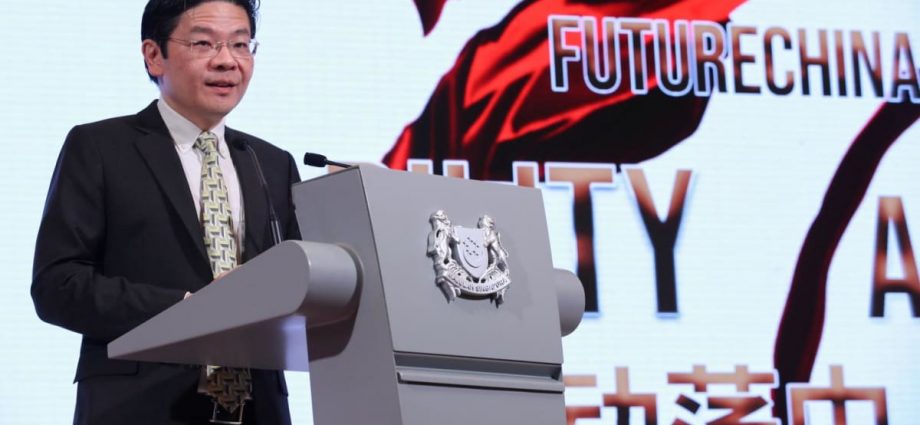
SINGAPORE: As Singapore and China continue to collaborate in emerging areas of the economy, this will open up new opportunities for businesses on both sides, said Deputy Prime Minister Lawrence Wong on Friday (Oct 7).
Speaking at the Future China Global Forum, Mr Wong said Singapore has consistently participated in and supported China as it opened up and reformed its economy over the past four decades.
This included establishing major Government-to-Government projects such as Tianjin Eco-City and Chongqing Connectivity Initiative, to support China’s economic development through its different phases.
These efforts have helped to strengthen ties between the two countries over the years, with China now Singapore’s largest trading partner while Singapore, China’s largest foreign investor, he pointed out, adding that the relationship is also reflected in close links between businesses and people.
“We are not standing still. Both countries continue to build on this strong foundation by collaborating in emerging areas of the new economy, such as the digital economy and the green economy,” said Mr Wong, who is also Finance Minister.
“This will open up new opportunities for businesses in both our countries in areas such as digital trade, digitally-enabled services, renewable energy, green financing, as well as environmental services.”
“GOLDEN AGE IS OVER”
During his speech, Mr Wong also noted that the world was entering a new era of geopolitical contestation that would bring about more economic decoupling and fragmentation.
“(The) golden age of globalisation that we enjoyed for more than 30 years is over,” he said.
“Previously, we all saw companies going for just-in-time efficiencies and lowest cost; now everyone talks about just-in-case precautions and greater resilience.
“Previously we all thought that countries did not have to be friends to do business. In fact, having more trade and investments was a very good thing, because it would tamp down geopolitical rivalry; but now there is a new logic at work: Geopolitical forces are shaping economics, trade and finance,” he added.
While no one can predict the kind of world order that would emerge from this, what is clear is that United States-China relations are consequential and will set the tone for global affairs, said Mr Wong.
“Unfortunately, relations between both countries have worsened over the past few years, we have seen an impact on trade, investment, and finance – not just between the two countries, but across the rest of the world too,” he said.
“If relations between the US and China continue to be fraught, we could witness further bifurcation of technology, splitting of supply chains, or even other unintended consequences.
“The reality is that both China and US are highly interdependent, and interlinked in the global economy … Even selective decoupling will come at great costs for companies everywhere, and certainly for our region and the world.”
FUTURE OF GLOBAL ORDER
Despite this state of affairs, Mr Wong said Asia, which has enjoyed more than 50 years of peace and stability since the end of the Vietnam War, should not resign itself to these external challenges.
“We should do whatever we can to find stability and to steer the trajectory of developments in the region towards peace and stability,” he said, adding that how US-China relations unfold would be an important factor.
“Neither side expects relations to improve any time soon,” Mr Wong noted.
“But we must all hope that relations do not worsen, and that there are no accidents or miscalculations that can make things much worse very quickly.”
With leaders from US and China due to meet in person soon, the hope is that both sides will reach an agreement, where they may compete vigorously in many areas, but also find ways to expand common ground and cooperate on areas of mutual interests, he said.
Mr Wong added: “In fact, there are indeed many global challenges which require joint US-China leadership to overcome – such as strengthening our global pandemic preparedness and marshalling global support to address the effects of climate change.”
Returning to Asia, he said countries should also recognise that the future of the global order will not be defined by US and China alone.
He stressed the need to stand firm on fundamental principles of international law, and to work with others to strengthen multilateralism and uphold the rules-based order.
“Singapore and ASEAN may not be able to do much to influence the course of US-China relations. But we will do all that we can to keep the region open and inclusive,” he said, adding that this includes encouraging major partners such as the European Union, Japan and India to build stakes in the region.
“Because for all of us in Singapore and ASEAN – this is not a matter of choosing sides; but it’s about making choices for ourselves, advancing our collective interests, and doing what is best for our peoples.”

